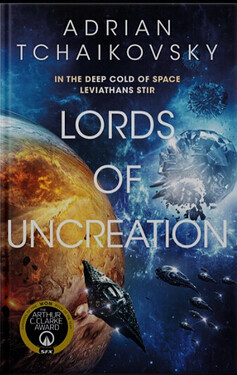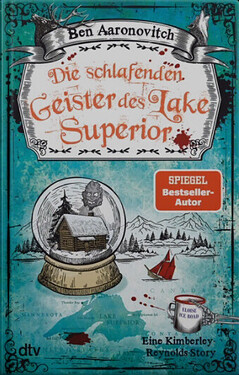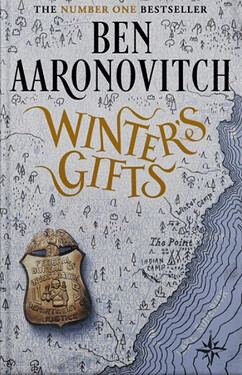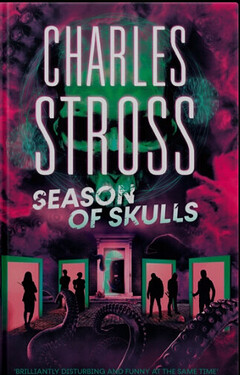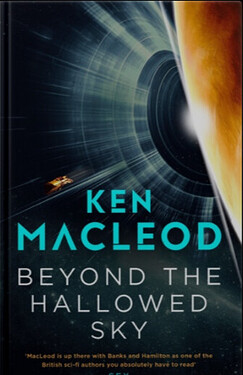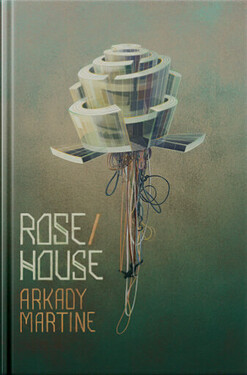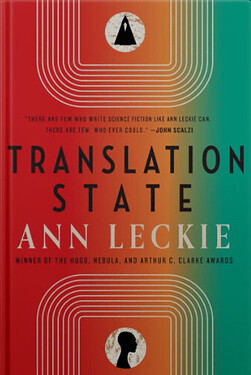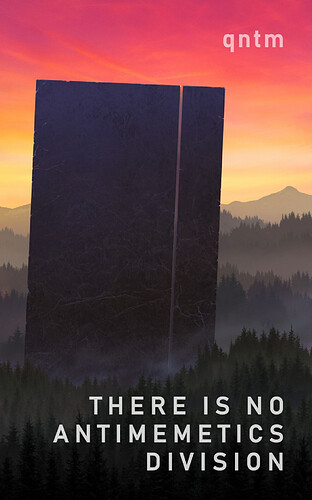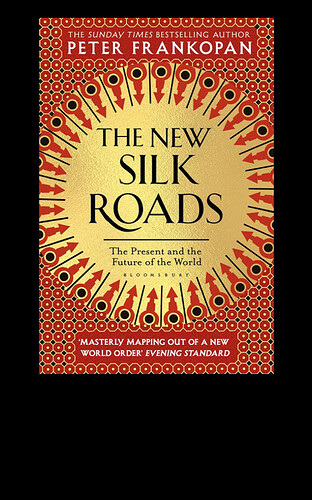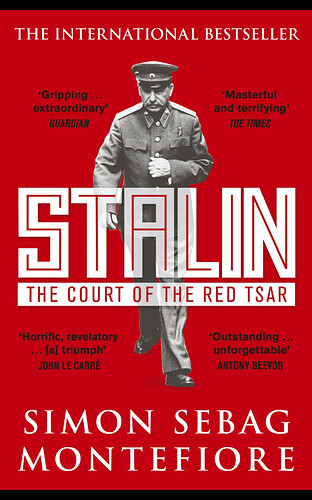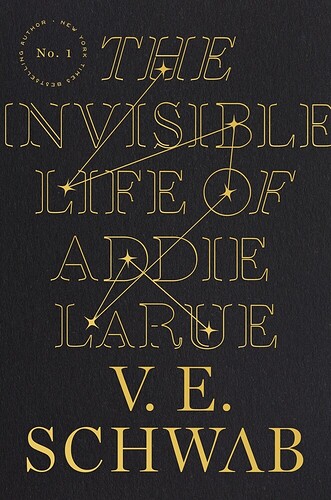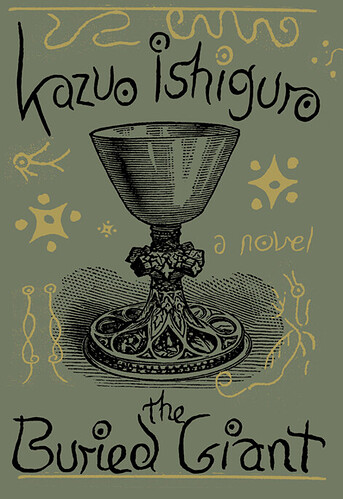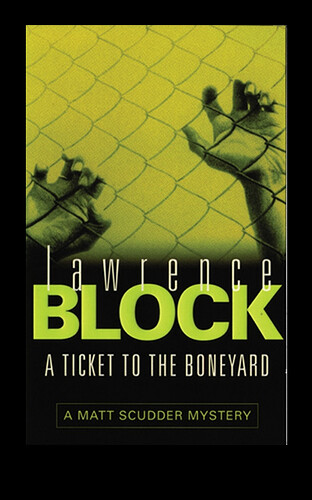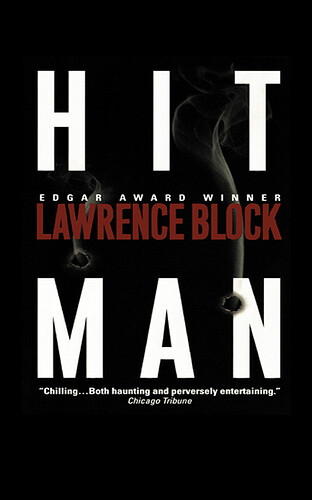Uh…
Lots of books I’ve been waiting for came at once. After a year in which I’ve genuinely worried about my ability to concentrate, it’s nice to have had a sustained reading session.
Volume 3 of the Final Architecture series. Grandiose space opera, gargantuan ships, big dumb objects that aren’t so dumb, aliens both comprehensible and incomprehensible, horrendous space kablooies, you know the drill. I was a bit lukewarm about the first volume upthread but this book very much sticks the landing. Very satisfying.
The same book twice. Unusually the German translation came out first. It took a month to read it in German and 2 hours in English because eh, not a linguist. Anyway, the Rivers of London series remains fresh and entertaining, not least because the main sequence of novels is interspersed with novellas and short stories where Ben Aaronovitch expands on the side characters. Here, Agent Kimberley Reynolds gets a whole story to herself, as something malign threatens a small snowbound town in Wisconsin. Rather darker than the main sequence.
If you’ve read the Laundry series by Charles Stress, there’s a point where the magic tips over from being a secret kept under wraps by the authorities to something huge and unavoidable, and this feels like a similar inflection point. Of course, in the Laundry series humanity loses and things go very badly indeed.
Speaking of which;
Volume 3 of the New Management series, or what happens after the stars come right, magic floods the world and the Black Pharoah is Prime Minister of the UK. Stross does Regency romance with time paradoxes, and a couple of fan service callbacks. Actually less bleak as such than the previous two books. It’s a truism that science fiction is about the present, and I think Stross has said these are more or less Brexit SF. Grimly amusing.
Ken MacLeod writes the same book again. If you’ve read the Engines of Light series, or the Fall Revolution series, especially the Sky Road, this will feel very familiar. Scottish kind-of-socialists post some vaguely-defined revolution in a world of somewhat-familiar power blocs go interstellar. I might read the next book, faute de mieux.
A locked room murder mystery where the locked room is an intelligent house infused by an unsympathetic AI which in other circumstances you could imagine declining to open the pod bay doors. It does actually refuse to open the front door, now I think about it. For all that it’s set in the southwestern US desert in a lightly-sketched-in climate-crisis future, a chilly book in which, in the end little is resolved and the malign architecture of the locked room turns away from the outside world. Very good.
A stand-alone novel which follows on from the Ancillary Mercy series. I like this book very much. It has the same feel - viewpoint characters who are somehow distanced from the world, but are compelled to try and make things right, space opera on a personal scale, and concentrations of power being points of failure. There’s an outside view of the Radch empire which is descending into fall-of-Rome civil war (but entirely off-stage) and we learn rather more about the Presger Translators.
Oh, anyone who had a hissy fit about pronouns in the original trilogy is going to hate this book. There’s even (I think) a sly reference to this when two different systems of pronouns collide and the Radch ambassador calls another character “she” and is corrected.
How do you fight a war against an enemy that you cannot perceive or remember, and if you do, it makes you stand out as a threat to them immediately amongst the unwitting population of the planet, who will watch you die and will be unable to realise what happened. Cleverly written, a little bit clumsy here and there, but overall very good. If you like SCP fiction, you will like this.
Another Frankopan, this time looking at modern ‘silk roads’. He might have bitten off more than he can chew here.
On the one hand, deeply researched. On the other, Montefiore obviously despises Stalin and this colours the entire work from the second page or so onwards. He also has the infuriating habit of switching between first and second names when talking about the same person, which is Pretty Fucking Bad for such a densely-populated book. I appreciate it for the work that has gone into it and the insight it provides using archival sources, I don’t appreciate Montefiore’s “Oooooh, weren’t they awful?” every few pages. We get it, Simon, you prefer the Tsars and their slave empire.
I know this is crazy even to venture, but you can hate Stalin’s gulags AND the Tsar’s slave empire.
Just played Prelude to Revolution last week where there is an End Victory condition in which the Tsar can dominate and both players lose. But even then, it’s hard to imagine how a resurgent Tsar could have been more aggressive or democidal than Stalin.
You can, but I’m not sure Montefiore does. He makes allowances for the Tsars he refuses to make for Stalin (" So you had to be tough to flourish in this position - almost brutal." - “Yes, you did.”), and is eager to tot up Stalin’s body count, but the body count under the Tsars is at most a handwave. Stalin didn’t have the benefit of a, mostly indifferent, Europe looking on at his bumbling autocracy, as his family inbreeding takes its toll via haemophilia, while he continued to run his slave empire into the ground, ignoring all warnings that people might be a teensy bit annoyed at his ineptitude, because he had a God-given right to rule.
If asked, Stalin would have pointed at The Revolution as his reason for doing things, however nebulous and forever-delayed it was via outside interference, and paranoia, both justified and not. The Tsars would have been affronted that you dared question them.
My Stalin history isn’t great, but are you saying you believe one could question his authority without consequence?
My Russian history isn’t great, and I’m not fond of autocrats, so what Tsar would you say was worse than Stalin in sheer bloodthirstiness? Other than Maybe Ivan the Terrible? 
Not necessarily his authority, but his motive and goals. Stalin was no dunce, and could talk at length about Marxism-Leninism, as a voracious reader and not-insignificant writer. He was not a particularly great theorist and writer like Trotsky, but could be quite eloquent.
@Natus I would counter with “Which Tsar improved his country to the point that standards of living jumped to an unprecedented level, and mortality fell to an unprecedented level?” Stalin’s paranoia was not without cause, but his crimes were numerous. That doesn’t justify the inflated totals people bandy about to demonize him (“20 million! No, 40 million!”), nor does it somehow justify the vast excesses of the Tsars, where torturing serfs was literally a part of daily life. The Tsars maintained tens of millions in crushing poverty because they could, for hundreds of years. The buying and selling of human beings was perfectly legal up until the 1860s in Russia. I don’t regard any rebellion in the face of that to be worthy of the same level of distaste.
Gee, I think when you are dismissing Stalin’s Great Terror, not to mention the Holodomor, with “his paranoia was not without cause”, then you’re really becoming an apologist for Stalin full stop. The Tsars didn’t gather together and decide to keep serfdom running per se…it was just part of Russian life for a long while. Same with Russian peasant poverty. They didn’t try to allay it, but neither did they enact a plan called “crushing poverty.” But Stalin did do these things, and I think anyone living during those times who was negatively affected would have preferred he did not.
The Tsars didn’t gather together and decide to keep serfdom running per se
They absolutely did, and, by the same standard, this is just being an apologist for the Tsars. For an openly autocratic system that they declared was granted to them by God, there is absolutely no excuse for them to then say “Oh, but we didn’t mean to.” Even Montefiore states outright that the Russian Empire was overseen by one man, and one man only, who was responsible for everything. You do not get to be an absolute ruler and at the same time claim “It was just part of life, what was I supposed to do about it?”
They didn’t try to allay it, but neither did they enact a plan called “crushing poverty.”
Violent suppression of serf rebellions was absolutely the norm. They did nothing to alleviate poverty and ensured the serfs were kept hip-deep in shit for hundreds of years, out of fear of losing power. Alexander II is hailed as one of the greatest reformers of the tsars, which is admittedly a low bar, but his reforms pale next to those of the USSR’s (including those during Stalin’s time).
But Stalin did do these things, and I think anyone living during those times who was negatively affected would have preferred he did not.
And the same goes for the Tsars, whose cruelty and arbitrary tortures and executions were regular, widespread, and continued for hundreds of years. I would just like there not to be a double standard, that’s all.
But you’re comparing one man (Stalin) to all the Tsars that ever were. Most were bad, some were less bad. Stalin was worse than any Tsar who ever lived, with the possible exception of Ivan the Terrible. I don’t think there’s really a comparison, and you can’t use serfdom as an excuse. Montefiore is exactly correct in being horrified by Stalin’s crimes. Shouldn’t we all be? I really don’t think a proper answer to the list of horribly punitive actions taken by Stalin is “Well, the Tsars were bad too.” Obviously, but that doesn’t change the strength of the central argument.
Stalin was worse than any Tsar who ever lived
Stalin oversaw massive increases in Russia’s material wealth, education, living standards, and commensurate enormous drops in mortality across all ages. I’m really not sure the calculus on that one is as one-dimensional as you make it out to be. A serf who wrote a letter (the majority couldn’t because they were deliberately kept illiterate) to Ivan the Terrible or Peter the Great complaining about his work conditions would have found himself brutally murdered for his impertinence. Stalin, somehow, was a complete maniac who was worse than any tsar, yet nevertheless read letters from common folk and took action over their complaints.
Montefiore is exactly correct in being horrified by Stalin’s crimes.
But not horrified, apparently, by the crimes of the tsars? In fact, he holds the tsars in high esteem for…being brutal? Peter the Great, a renowned sadist, torturer, and murderer, is described by Montefiore as ‘brilliant in every way’. The tsars oversaw an enormous amount of slavery, and the vast majority of them had no qualms about it. If I’m somehow doing them a disservice by comparing them all against Stalin, that’s really unfortunate, but Stalin looks to me like a preferable alternative to another 300 years of crushing untold millions into the dirt simply because the tsars believed they had the God-given right to.
An individual perpetuating a system which is outright evil is not somehow less culpable for its existence because it predates him, especially not when, and again this is Montefiore’s own words “the tsar was a monarch of exceptional and extraordinary gifts, blessed by god, who could do anything he wanted in the world.”
What deepens Montefiore’s hypocrisy is not just that his family are a bunch of toffs and that’s where his sympathies lie, it’s that even in the title of the book, he labels Stalin a ‘tsar’, but judges him by a yardstick which would indict countless others.
A young French woman in the 1700s makes a deal that allows her to live without aging, but also without anyone remembering her, until a chance encounter hundreds of years later. The story jumps between her past and the present day, slowly filling in the gaps in between. Fun read.
An elderly couple leaves their village in search of their son, though they can’t remember why he left or where he’s gone. While this book is ostensibly a fantasy tale set in the Dark Ages, I couldn’t escape the feeling I was missing some deeper symbolism throughout the story. Tempted to find something dumb to read next to make myself feel smarter.
Steelheart was dumb, in a standard YA lit way. Sanderson, man. Like Scalzi, he knows exactly how hard he has to work to write something just worth reading for lots of people. I genuinely admire it, while wishing their output was a bit better, because I think they have the talent to do it (even though most people couldn’t match their standard even when they’re just banging stuff out). But my kids liked it, so I bought the board game (The Reckoners), which is overproduced and slightly underbaked, but basically very good. Lots of options, lots of interaction with your fellow players. I’ll probably read the rest of the series, but was looking for a bit of a break from the YA-ness of it, so I switched to Even Though I Knew the End. To be fair, it’s also kind of trashy, but at least it’s trashily noir fantasy.
I like Sanderson but do agree with your take in his work. His Skyward series goes even further into the YA genre and I’m not a huge fan. That said, my kids enjoy his YA work, so I guess he’s writing something for everyone in my family. Except my wife. I think if I forced her to read a Stormlight book it would be grounds for divorce…
No matter what you think of his output, though, Sanderson is an absolute machine. We’ve got guys like George R.R. Martin and Patrick Rothfuss who write a book once every two decades and Sanderson seems to drop a 1000-page epic every couple of years with a couple novels from 2-3 other series just casually spread between.
He’s like the Ryan Laukat of writing.
Haha, Rothfuss, he did write a book once, good times, good times.
Oh, absolutely! It’s astounding that they seem to be able to write pretty good, entertaining books so fast. If we can get a good book a year or a great book every ten, I’m not sure they’re choosing badly.
Block is one of those writers that makes the humdrum not only readable, but compelling. His Scudder novels are a bit more bleak than usual, but they’re not bleak enough to be challenging. Speaking of writers who consistently produce good books, Block is up there, producing solid if unexceptional novels.
His Keller series is my favourite, a hitman who has his quirks, and a sideline in philatelism. Not as bleak as the Scudder novels, not as cute as the Rhodenbarr books, but a comfortable middle ground, with a protagonist who can’t stop thinking, some entertaining dialogue, and each book is just a comfortable cruise through the daily life of a man who kills people for money.
